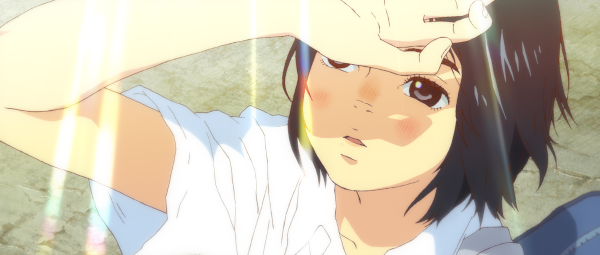Children Of The Sea (2019)
There's something about the call of the sea that has drawn in Japanese animators time and again. Maybe it's being an island nation, where you're only ever a few hours away from the ocean that has made it a source of fascination for some of the medium's greatest talents, such as Hayao Miyazaki (Ponyo) and Masaaki Yuasa (Lu Over The Wall and Ride Your Wave). Maybe its that animation can take us beneath the waves in a way live-action never could , that has similarly inspired western animation classics like The Little Mermaid and Finding Nemo.
Children Of The Sea is the latest film from the renowned Studio 4°C, directed by Ayumu Watanabe (Space Brothers), based on the award-winning manga by Daisuke Igarashi. This month the film debuts on home video in the United States and Canada (on Blu-Ray, DVD and Digital formats) as well as making its debut in the United Kingdom via online festival Screen Anime.
Ruka is a young girl living in a Japanese seaside town. After being sent home from her summer break sports practice for injuring another girl, she goes to visit her Father at the Aquarium where he works. There she encounters a strange boy, apparently around her age, who suddenly dives into one of the tanks and starts swimming with the fish. It turns out the boy, Umi, and his older brother Sora, were washed ashore after years of living in the Ocean. They were taken back to the aquarium to be studied, and Ruka soon discovers she also shares a deep connection to the sea. What is the mysterious song she keeps hearing, and how is she connected to these two strange boys?
The basic plot makes it sound like a gender-swapped version of Ponyo and Lu's boy-meets-fish story. However, both tonally and in terms of the story itself, Children Of The Sea has little else in common with those fairy-tale inspired films. This is a very different kettle of fish.
For starters, the film is played straight, and there's really none of the fish-out-of-water comedy you might expect. Instead, we get a magical realist fantasy that's thoroughly rooted in our reality. The story is driven by the central mysteries of the children's existence. The audience is as in the dark as the protagonists, so it keeps you glued to the screen.
The pull of the mystery is so strong that the film doesn't really have any antagonists (unless you count the bully that Ruka lashes out at in the film's early part). There's a character whose motivations eventually put him (sort of) in that role, but they never really get to be a threat.
Studio 4°C found fame by being pioneers in digital animation, but it is the hand-drawn side that is doing the heavy-lifting here. The human character designs are given a distinctive look with a sketchy style to the faces. With the exception of one character we meet later- who has a very unusual look- they are otherwise conventionally attractive and it's all smoothly animated. The natural elements are largely 2D, with the more obviously digital, 3D elements saved for machines, vehicles, some elements of backgrounds and some fancy camera work. There are times where you can see the seams, but by and large, it all blends effectively.
The animation set design and sound design work together in harmony to create a beautiful sense of place. The lighting and the echo help recreate the atmosphere of being inside an Aquarium which will be familiar to anyone who has ever been to one in real life. You can virtually smell the sea air on the seaside scenes, or feel the sensation of being in a torrential rainstorm.
The film's sense of wonder really steps up a gear in scenes that take place on the sea's surface or underwater. It's full of beautiful imagery, blue tropical oceans and pink summer sunsets. Beneath the waves, or in aquarium tanks, the sealife plays a major part in the story- and the film's appeal. Animated with photo-realistic attention-to-detail, it's more Blue Planet than The Little Mermaid.
This sense of natural wonder is only added to by the score from Miyazki's frequent composer, Jo Hisashi. The music complements the beautiful visuals perfectly. Even if- on first watch, at least- it lacks the more obvious hook of some of his Ghibli collaborations.
It's often said that we know more about parts of space than we do about the contents of our own oceans, and Children Of The Sea makes the connection between the seas and the sky explicit. The climactic events are set in course by the coming of a meteorite. In one phenomenal scene, the stars in the night sky are reflected on the surface of the ocean, making it seem as if they are one. The otherworldliness of life beneath the sea makes it seem alien to humans, so it makes sense it would have a closer connection with the universe than we do.
The climax goes into stranger but still spectacular imagery, with changes of animation style and philosophical themes. Think similar territory to the end of Akira or Evangelion (TV version) expect weirdness and don't expect direct answers, and you'll be not far off.
Children of The Sea tells a compelling story, but it's true biggest draw are its visuals. Do yourself a favour and don't watch this is on a tablet (or even worse- a phone). It's a shame that its cinema screenings were (understandably) cancelled as this deserves to be seen on the biggest screen possible. You won't see many better looking animated movies this year.

**SCREENING LINK PROVIDED BY: SHOUT FACTORY**
Children Of The Sea is the latest film from the renowned Studio 4°C, directed by Ayumu Watanabe (Space Brothers), based on the award-winning manga by Daisuke Igarashi. This month the film debuts on home video in the United States and Canada (on Blu-Ray, DVD and Digital formats) as well as making its debut in the United Kingdom via online festival Screen Anime.
Ruka is a young girl living in a Japanese seaside town. After being sent home from her summer break sports practice for injuring another girl, she goes to visit her Father at the Aquarium where he works. There she encounters a strange boy, apparently around her age, who suddenly dives into one of the tanks and starts swimming with the fish. It turns out the boy, Umi, and his older brother Sora, were washed ashore after years of living in the Ocean. They were taken back to the aquarium to be studied, and Ruka soon discovers she also shares a deep connection to the sea. What is the mysterious song she keeps hearing, and how is she connected to these two strange boys?
The basic plot makes it sound like a gender-swapped version of Ponyo and Lu's boy-meets-fish story. However, both tonally and in terms of the story itself, Children Of The Sea has little else in common with those fairy-tale inspired films. This is a very different kettle of fish.
The pull of the mystery is so strong that the film doesn't really have any antagonists (unless you count the bully that Ruka lashes out at in the film's early part). There's a character whose motivations eventually put him (sort of) in that role, but they never really get to be a threat.
Studio 4°C found fame by being pioneers in digital animation, but it is the hand-drawn side that is doing the heavy-lifting here. The human character designs are given a distinctive look with a sketchy style to the faces. With the exception of one character we meet later- who has a very unusual look- they are otherwise conventionally attractive and it's all smoothly animated. The natural elements are largely 2D, with the more obviously digital, 3D elements saved for machines, vehicles, some elements of backgrounds and some fancy camera work. There are times where you can see the seams, but by and large, it all blends effectively.
The film's sense of wonder really steps up a gear in scenes that take place on the sea's surface or underwater. It's full of beautiful imagery, blue tropical oceans and pink summer sunsets. Beneath the waves, or in aquarium tanks, the sealife plays a major part in the story- and the film's appeal. Animated with photo-realistic attention-to-detail, it's more Blue Planet than The Little Mermaid.
This sense of natural wonder is only added to by the score from Miyazki's frequent composer, Jo Hisashi. The music complements the beautiful visuals perfectly. Even if- on first watch, at least- it lacks the more obvious hook of some of his Ghibli collaborations.
It's often said that we know more about parts of space than we do about the contents of our own oceans, and Children Of The Sea makes the connection between the seas and the sky explicit. The climactic events are set in course by the coming of a meteorite. In one phenomenal scene, the stars in the night sky are reflected on the surface of the ocean, making it seem as if they are one. The otherworldliness of life beneath the sea makes it seem alien to humans, so it makes sense it would have a closer connection with the universe than we do.
The climax goes into stranger but still spectacular imagery, with changes of animation style and philosophical themes. Think similar territory to the end of Akira or Evangelion (TV version) expect weirdness and don't expect direct answers, and you'll be not far off.
Children of The Sea tells a compelling story, but it's true biggest draw are its visuals. Do yourself a favour and don't watch this is on a tablet (or even worse- a phone). It's a shame that its cinema screenings were (understandably) cancelled as this deserves to be seen on the biggest screen possible. You won't see many better looking animated movies this year.
IN A NUTSHELL: Jaw-dropping visuals make for an unforgettable fantasy that is a love-letter to the beauty of the natural world.
**SCREENING LINK PROVIDED BY: SHOUT FACTORY**





























